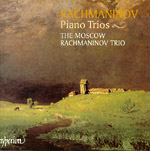As you would expect from their shared “Elegiac” title, Rachmaninov’s two piano trios are among his more overtly heart-on-sleeve compositions. Composed in the early 1890s, both works were influenced by the style of Rachmaninov’s mentor, Tchaikovsky. The Moscow Rachmaninov Trio is clearly up to the expressive challenges posed by the music, pouring on the emotion from the outset of Trio No. 1. But it’s not all swooning and breast-beating; the trio’s robust tone, rhythmic precision, and faultless intonation also generate excitement and serve to effectively communicate the music’s romantic spirit. The Moscow players are no less convincing in the even higher-strung Trio No. 2, composed in memory of Tchaikovsky (who died in 1893). Listen to how the ensemble vividly conveys both the opening Moderato’s gloomy mood and the subsequent torrent of anguish. As good as this is, the Beaux Arts Trio’s more measured performances of both works present a more penetrating drama, and its recording easily maintains its classic status.
The Two Pieces for Cello and Piano, and Two Pieces for Violin and Piano come from the same early period in Rachmaninov’s career and already display his amazingly assured technique and penchant for memorable melodies (especially as played by the Moscow soloists). Hyperion’s recording lives up to its usual high standard of balance, depth, and clarity.
































